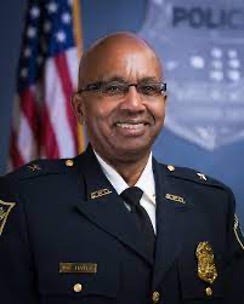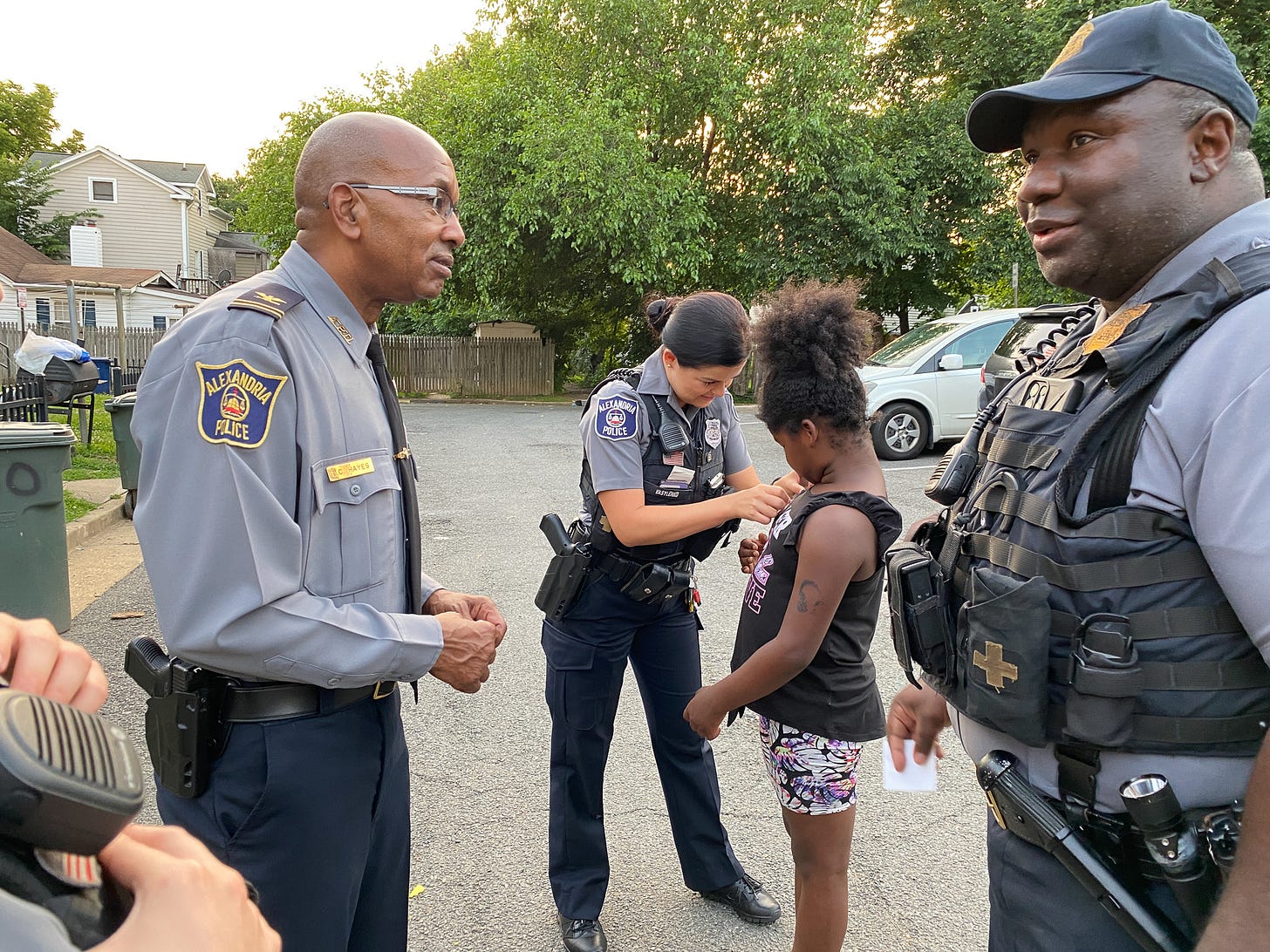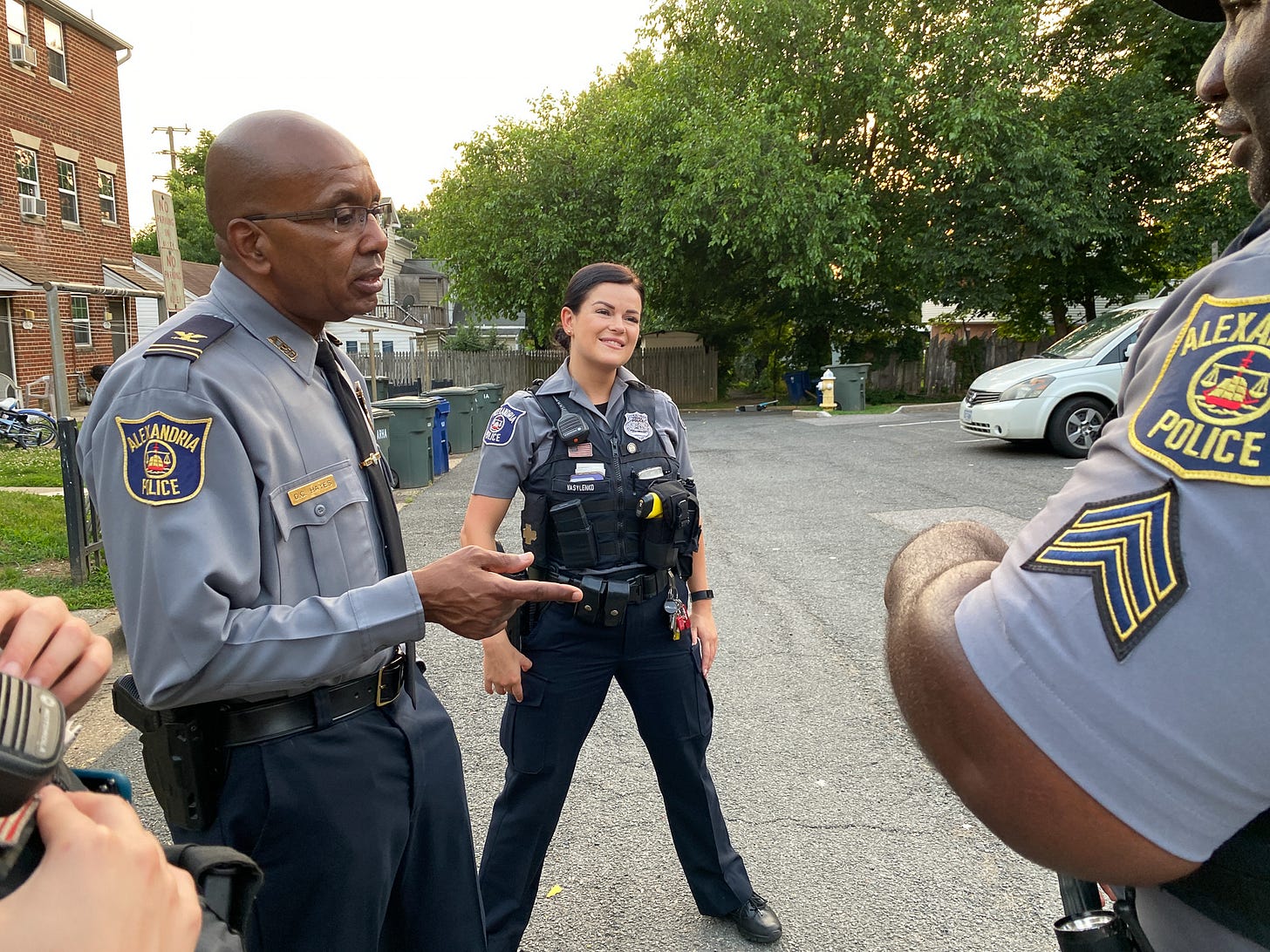From Patrolman to Chief
APD's Don Hayes shares his law enforcement philosophy. From The Alexandria Times, July 7, 2022
Don Hayes, Alexandria’s new police chief, intuitively understood community policing – officers can be more effective if they know, and are known by, the community they serve – when he joined the police department more than 40 years ago.
Hayes, a Washington, D.C. native, grew up near Sixth Street and Florida Avenue, NE in a family of nine children. After enlisting in the Air Force in 1976, Hayes became interested in law enforcement. In 1980, he joined the Alexandria Police Department and in the ensuing 42 years has been involved in almost every aspect of the department.
Hayes lives in Alexandria with his wife of 42 years. He has two children, one of whom is a firefighter and the other a financial analyst.
Hayes said that he fell in love with community policing in APD long before it was identified by the Obama Administration as a programmatic approach to law enforcement.
“Sergeant Herman Springs kind of took me under his wings – he knew everybody in the community. He did a lot of work in the schools,” Hayes said. “He showed me how to really understand what my role should be in policing and that is to really get to know the people in my community and let them get to know me.”
Hayes said the communication skills he learned while growing up in a large, close knit family have helped him with community policing.
“Those relationships begin to foster partnerships. People know who you are, they know what you’re doing and that impacts crime. If they know you care, they will work with you,” Hayes said. “I have been drawn to people. Growing up in a big family, we were always hanging around each other; we liked communicating with each other.”
Helping people is the real purpose of law enforcement, Hayes said.
“If you asked me how many people I’ve arrested, I couldn’t tell you. If you ask me how many I’ve helped, it’s a lot,” he said, “I think a lot of people in law enforcement don’t understand that because a lot of people came to this career to ‘lock ‘em up.’”
Tara and Michael May, APD lieutenants, are married and have lived in Alexandria for over 20 years. Tara May said she experienced “an instant connection, professional and friendship” with Hayes. The Mays asked him to be a reader at their Pennsylvania wedding. She said that Hayes, who was a clergyman at Oakland Baptist Church, sees APD as part of his extended family.
Former Chief of Police Charles Samara asked Hayes to start the Drug Abuse Resistance Education program in Alexandria. DARE is a school-based drug prevention program originally developed by the Los Angeles Police Department. Hayes said he fell in love with the program.
“You’re going to pay me to go into the schools and work with kids all day long?” Hayes said he incredulously asked Samara.
The DARE program has been discontinued in Alexandria, because, Hayes said, “They wanted to play the numbers game. You can’t prove that DARE works, but I know it works.” Hayes cites conversations with numerous Alexandrians who sought him out because they recall his work as their DARE teacher.
Hayes believes that early drug prevention programs reduce the cost of intervention and prevention and save lives, even if arguments can be made about metrics of effectiveness.
“It [prevention] is not just a cost saver, it’s a life saver,” Hayes said.
APD is dealing with a significant staffing shortage, and Hayes acknowledges that recruiting new police officers is particularly challenging. “We have to hire people who want to be police officers,” Hayes said. “They’re still there, but they want to join an agency that’s trying to foster that change, that is reimagining policing out there and that is going to be policing for all the communities, not just certain communities.”
He said that recruiting candidates from Alexandria and surrounding communities requires building trust. “They have to really trust you. That trust comes from what you do every day, not from what you do when something’s happening in their neighborhood,” Hayes said. “You have to be there. You have to develop a relationship with the young people. They have to see us as part of the community, not set apart.”
Playing pick-up basketball at recreation centers helped Hayes establish relationships. “I would put my sweats on, and you would see me at Charles Houston Recreation Center,” Hayes said. “They would still call me Officer Hayes, but they looked at me as being someone who was their neighbor and was willing to help.”
Michael Johnson, a 26-year employee of the Department of Recreation, Parks and Cultural Activities, is a community outreach specialist who helps underserved young people in crisis. He said that Hayes, then a patrolman, stepped forward to offer help during a 1980’s crack epidemic. “[Hayes was] the first law enforcement officer to engage with us. He coordinated with us, went on every trip, and helped found [male youth anti-drug organization] the Untouchables,” Johnson said.
Hayes said he looks forward to APD’s implementation of body-worn cameras.
“The officers here want the cameras. They want the cameras to show people what a good job they are doing. The statistics have proven that there is more positive out of the cameras than negatives,” Hayes said. “Complaints actually go down because both [parties] know that everything is being filmed.”
Another new initiative, the Alexandria Crisis Intervention Co-Responding program, pairs a health clinician with a trained behavioral police officer for citizens subject to temporary detention orders or emergency custody orders.
“Council has now approved us to get two more teams together so we can have 24-hour coverage,” Hayes said. “The ultimate goal is to have a team that can respond that doesn’t include law enforcement [personnel] because it [behavioral health] is not really a crime.”
“We train officers how to de-escalate situations now and how to give a person some space and to de-escalate by talking to them in a reasonable way,” he said. “We’re trained to have that command presence and use your voice of authority. We’re going away from some of that. We want officers to make better decisions about how to help [people] to get the resources they need to deal with their crisis.”
Former Sheriff Dana Lawhorne, an expert in crisis de-escalation during his 27- year APD career, said Hayes is a good listener with a good sense of humor. “What strikes me about Don is how much he cares about everyone, no matter who you are. He is not judgmental about people or situations,” Lawhorne said.
Hayes acknowledged polls that show residents are concerned about crime. “Crime is going up everywhere, violent crime is going up,” he said. “There are a lot of people speculating as to why it’s happening – from the pandemic, being closed in, a lot of mental health situations, inflation, people don’t have jobs. There’s a whole gamut of reasons as to why people are doing more crime and more violent crime.” “I don’t really have the answer for exactly why it’s going on, but I can tell you we have to address it. A lot of it is dealing with guns. We’ve never seen as many guns on the street as people have today,” Hayes said.
The city’s adopted budget authorized five additional APD positions to combat violent crime, which Hayes said should help.
“We know a lot of the people who are actually doing the shootings and crimes, but we cannot violate their constitutional rights. And so, we have to make sure that we are staying within the law in doing the right investigations in bringing them to justice so that [Commonwealth’s Attorney] Bryan Porter can prosecute them,” Hayes said.
Hayes said Alexandria’s surge in violent crime is due to a consistent group of perpetrators. “There are at least 50 young men that are involved in these shootings,” he said.
Hayes said that while crime metrics have value, the best way for Alexandrians to understand public safety is to become involved with their citizens’ associations and to understand what is going on in their neighborhood.
“The biggest challenge we have in public safety now is getting people to understand that sometimes the fear of crime is just as bad as the crime. If you are afraid to go out of your house, that’s not good,” Hayes said. “You want to talk to people, including long-time residents, to get their perspective. When there is an issue, hook up with the police department and become partners with us.”
He believes that cross-agency cooperation is essential to successfully combating crime. “In today’s society in dealing with crime, the police department is necessary but is not sufficient” without partnerships with citizens and organizations, Hayes said.
Damon Minnix, president of the police union, has known Hayes for 15 years and meets with him every month. “He has a good reputation from the senior staff on down. It’s his ethic – he is such an upright person and is never coming from a place of maliciousness,” Minnix said.
Hayes said he understands why Alexandria’s discussion about the School Resource Officers has been difficult, but that he believes SROs are both necessary and effective. He said SROs only do what they can do by law, and though statistics show Black males are disproportionately disciplined, “[SROs] are only there because a criminal thing has happened,” Hayes said. “[But] because of some past histories they don’t want us in the schools.”
“We have people in our education system who are going to the schools who believe that they are being treated differently than another class of people. It’s actually a race issue but they don’t want to say it. They believe we have police officers in school to perpetuate the school-to-prison pipeline, which we don’t,” Hayes said. “The perception becomes reality.”
Hayes acknowledged that the 2021 suspension of the two ACHS King Street SROs has gone on for a long time. One of them is now back in the street. “I love both those officers and they know that. I believed in what they were doing. When they had an event, I was there. When this other matter [a complaint by a former student] happened, it really did something to that program. It was very unfortunate,” he said.
“I believed that they were the heroes that we needed to go back to that school at that time and that they would have been able to address those issues differently because of the relationships and the respect they had earned,” Hayes said.
Hayes said it’s essential that law enforcement move beyond the current quagmire it finds itself in, because “there has to be a better way” than the path public safety is on. “It’s 2022 and from a law enforcement standpoint I thought we would be much further along with reimagining policing and community policing and we’re still having the types of situations where officers are shooting people of color – we’re going through these dynamics over and over again,” Hayes said.
“We have to have some serious conversations about how to make it better. We’re not always on the side of right but going forward we’re going to build that trust in everybody so that we can be an entity that truly stands for the oath, ‘To serve and protect all mankind.’”
-aboutalexandria@gmail.com









This is an important profile. I'm glad to know that someone with these values is in a leadership position in Alexandria law enforcement.